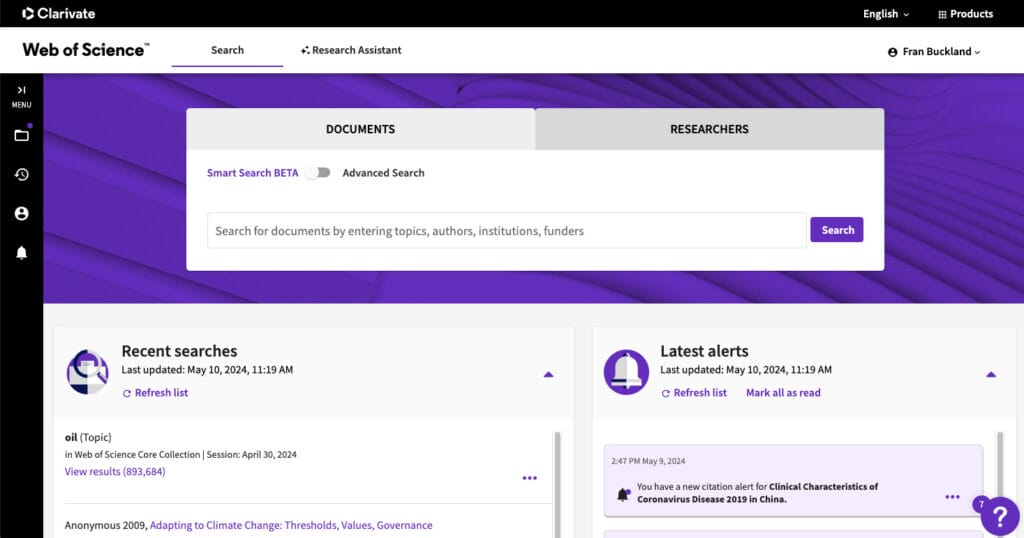Used by millions of academic researchers worldwide, the Web of Science is a prime candidate for the application of artificial intelligence. It's a citation database - meaning that it’s essentially a structured collection of scientific literature - datasets, dissertations, research papers, conference papers, books and so on - forming a research and discovery tool that can be used to track, measure and evaluate scientific research. It’s available as a subscription service to academic institutions and has been around in some form since the 1950s. It has been owned for the last 27 years by global information services provider Clarivate.
Pioneering the use of AI at Web of Science is vice president of product management Francesca Buckland. She has overall responsibility for everything product related - defining the roadmap, being the voice of the customer, go-to-market strategies and technology development. With an undergraduate degree in physics, her background includes time as a technology consultant for KPMG and as product manager at a scientific publishing house. She’s been at Clarivate for five years. Her product team is global and 25-strong - with three product directors, eight product managers, business analysts and product operations managers. Generative AI is supercharging much of the work that Francesca and her team do, she says, speeding up much of their work and offering new ways to solve problems.
As a large publicly-quoted company, Clarivate does product development at scale, says Francesca, and its academic and government business unit (which Web of Science is part of) has “hundreds and hundreds of products”, some bigger than others, some growing faster than others. But like so many other businesses, its product development is limited by its data science capabilities, which has sparked the demand to introduce new AI features. About six months ago, Francesca led the creation of a central AI product team for the business unit. This central team consists of about five product people and 25 data scientists, as well as dev ops and programme management staff. They’re developing an internal platform to democratise access to generative AI technology across the business unit.
“We always have to prioritize where we invest our data science capability. This platform is going to allow every product team, not just my product team, access to generative AI with guidelines around how to use it, how to control costs and so on.”
Francesca Buckland
Clarivate
Machine learning algorithms have long been part of the Web of Science. It’s a citation database, so algorithms that, for example, identify people or organisations are integral - you want to be able to distinguish the research of John Smith at Imperial College from the work that John Smith at MIT is doing. AI may be the next frontier, she says, but it won’t change the nature of the work that Clarivate’s product people do to solve customer problems. For example they’re now able to use artificial intelligence to address the huge issue of research integrity - AI is used to run over content submissions and spot potential bad actors and AI-generated content.
AI is also helping to reduce costs at Clarivate. The work at Web of Science involves indexing data and content, but the information can be submitted in a variety of formats, anything from full text XML to print journals that then need to be scanned so the information in them can be extracted.
The use of AI to replace the human effort in extracting and indexing this information has meant huge savings.

The Web of Science interface is very information-rich, Francesca explains, and users often don’t know how to navigate it, or even how to formulate the right questions in order to navigate it. Francesca says: Clarivate is using a generative AI tool to help users to navigate and interpret what they see and to interact with our information in a way that doesn't just show them a page with a lot of graphs and charts and things that they might not understand. Says Francesca: “We've had really good user feedback on that.”
“
As the voice of the customer, product people are best placed to be the enablers of the AI boom
”
But they need to work with data scientists who supply the knowhow on whether those needs can be met. She points to a generative AI research assistant for Web of Science currently under development and says that data scientists are taking part in the focus groups for this product.
The academic community was full of doom-mongering when ChatGPT appeared, with predictions it would write student papers and research papers and generally turn the industry on its head. Now that the dust has settled, Francesca finds that Clarivate customers, like the academic researchers using Web of Science, want generative AI capabilities to help them integrate their products successfully. She points to a Clarivate AI product called Alethea which acts as a personalised teacher or coach, as an example of this kind of innovation. She says: “It helps the student and prompts them through their learning,” she says. “It's not about giving them the answer, it's about helping them find the information. It’s the sort of idea that comes from listening to users, what they want, and using the tool to solve user needs. And that’s a fundamental of product management.”
Francesca sees lots of benefits from AI in the next couple of years - translation capabilities being one example. Research is global and English is the lingua franca of research, but good quality research can be let down by poor quality writing. “Generative AI has a really interesting part to play in helping the writing of research and in the ability to interrogate content in any language,” she says. But there are big questions that still need to be answered. For example: “In research, novelty is very important,” she says.
“
If you as a questioner ask a tool a question and link together two ideas that no one has done before, how can we protect your intellectual property as the questioner?
”
Francesca says that the user experience is changing with the use of AI. In the research field, users want transparency and traceability, so if a product recommends an article or generates a response to a question based on a set of articles, they'll want to interrogate that response. They want to understand the response they get and the content that they’re shown.
Francesca also emphasises the importance of maintaining a product-led approach when deploying AI tools. You won’t be successful if you launch a tool just because it has a certain capability - what’s needed is an understanding of the user and the user needs. She says: “If you want repeat usage and to grow your business and increase revenue, that comes from solving user problems. And those connections aren't made unless you have good product management.”













Comments
Join the community
Sign up for free to share your thoughts